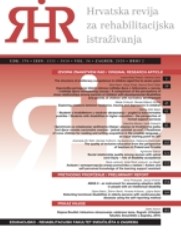USPOREDBA PERCEPCIJE BLISKIH ODNOSA RODITELJA DJECE S TEŠKOĆAMA U RAZVOJU I RODITELJA DJECE NORMATIVNOG RAZVOJA
A COMPARISON OF THE PERCEPTIONS OF CLOSE RELATIONSHIPS AMONG PARENTS OF CHILDREN WITH DEVELOPMENTAL DISABILITIES AND PARENTS OF CHILDREN WITH NORMATIVE DEVELOPMENT
Author(s): Mira Klarin, Višnja Čirjak, Slavica Šimić ŠašićSubject(s): Social psychology and group interaction, Behaviorism, Family and social welfare
Published by: Sveučilište u Zagrebu, Edukacijsko-rehabilitacijski fakultet
Keywords: attachment patterns; quality of family functioning; social support; children of normative development; children with developmental disabilities;
Summary/Abstract: The aim of this research was to compare the close relationships of two groups of parents, parents with a child of normative development and parents with a child with developmental disabilities. A total of 193 parents of 4- to 5-year-old male children participated in the study, of which 116 were parents of children of normative development and 77 parents of children with disabilities. The following measuring instruments were used to answer the research questions: State Adult Attachment Measure, Quality of Family Functioning Scale, and Social Support Scale. Non-parametric statistical procedures were used for data analysis. The results of the study indicate that close relationships among parents of children with disabilities are characterized by greater security-seeking. The quality of family functioning is the same for the two groups of parents, while parents of children with disabilities receive less support from friends. Also, the results of this study support the conclusion that mothers with a child with a disability are more likely to seek closeness from close others than fathers from the same group of parents. The findings indicate the importance of considering families as a system, especially those families with a child with a disability, which may include different programs aimed at working on family dynamics and partnerships, especially in vulnerable families.
Journal: Hrvatska revija za rehabilitacijska istraživanja
- Issue Year: 56/2020
- Issue No: 2
- Page Range: 19-44
- Page Count: 26
- Language: English, Croatian

